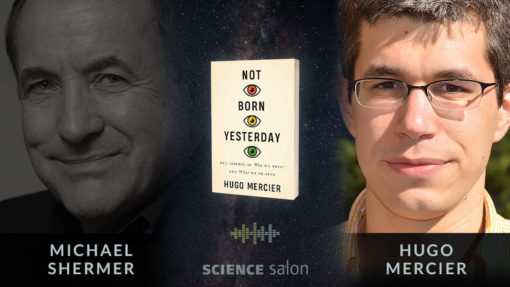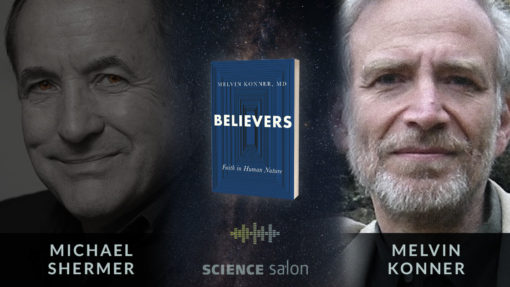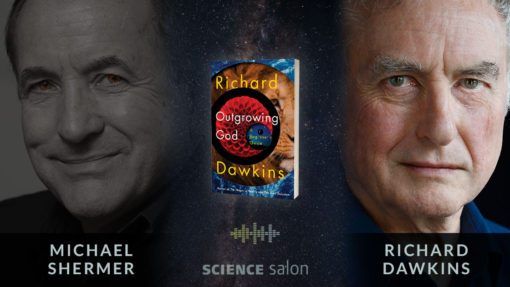belief

Not Born Yesterday explains how we decide who we can trust and what we should believe — and argues that we’re pretty good at making these decisions. Hugo Mercier demonstrates how virtually all attempts at mass persuasion — whether by religious leaders, politicians, or advertisers — fail miserably.
In Science Salon # 101 Michael Shermer speaks with Hugo Mercier about his new book: Not Born Yesterday: The Science of Who We Trust and What We Believe.
In Science Salon # 93 Michael Shermer speaks with evolutionary psychology professor Geoffrey Miller about his book: Virtue Signaling: Essays on Darwinian Politics and Free Speech. Plus, Michel Jacques Gagné examines the reasons shocking events like the Kennedy assassination give rise to conspiracy myths.

Why did JFK’s untimely death produce so many clashing interpretations of one of the most meticulously documented periods of history? This article examines the reasons shocking events like the Kennedy assassination give rise to conspiracy myths. Such stories, though based on ostensibly historic events, serve a contemporary agenda, namely by scapegoating a source of existential evil and promoting a paranoid counter-ideology to defeat it. This essay appeared in Skeptic magazine 22.4 (2017) and was presented to the 2017 Concordia-Vanier Liberal…

Shermer and Konner discuss: Konner’s experience living among hunter-gatherers • how hunter-gatherers conceive of religion vs. modern peoples • the “Big Gods” theory of religion • the “God Module” • why faith is not for everyone • the rise of the nones, but why religion will never completely die out • the upside of religion, and more…
In Science Salon # 90 Michael Shermer speaks with world renowned biological anthropologist Mel Konner who examines the nature of human nature, including (and especially) in his new book on the nature of religiosity. PLUS: In an article originally published in Quillette on Halloween, October 31, 2019, Dr. Shermer argues that patternicity, agenticity, pessimism, the negativity bias, and the Second Law of Thermodynamics provides a deeper explanation for why conspiracy theories are so popular and enduring. The article is based…
In Science Salon # 89 Michael Shermer speaks with Richard Dawkins about his new book Outgrowing God. Dawkins explains how the natural world arose without a designer and challenges head-on some of the most basic assumptions made by the world’s religions. PLUS: Is the statement “We are living in a post-truth world” true? If your answer is “yes” then the answer is “no” because you’ve just evaluated the statement in an evidentiary manner, so evidence still matters and facts still…

Richard Dawkins explains how the natural world arose without a designer — the improbability and beauty of the “bottom-up programming” that engineers an embryo or a flock of starlings — and challenges head-on some of the most basic assumptions made by the world’s religions.
We are pleased to announce Dr. Michael Shermer’s brand new 12-lecture Audible Original Course: Conspiracies & Conspiracy Theories — What We Should and Shouldn’t Believe — and Why, available now from audible.com. PLUS, in Science Salon # 83, Michael Shermer speaks with Peter Boghossian about his new book How to Have Impossible Conversations: A Very Practical Guide.
In response to last week’s trifecta shootings in Gilroy, El Paso, and Dayton, Michael Shermer offers an analysis of the psychology of mass public shooters, or why people act on their beliefs, why almost everyone thinks their beliefs are ontologically true and morally right, and why political rhetoric matters.

In response to last week’s trifecta shootings in Gilroy, El Paso, and Dayton, Michael Shermer offers an analysis of the psychology of mass public shooters, or why people act on their beliefs, why almost everyone thinks their beliefs are ontologically true and morally right, and why political rhetoric matters.
In Science Salon # 72, Michael Shermer speaks with visionary astronautical engineer Robert Zubrin where he lays out the plans for how humans can become a space faring, multi-planetary civilization; PLUS social psychologist Carol Tavris reminds us just how imperative it is that justice requires us to assess the evidence when public opinion and emotion are weighted heavily in favor of one side.

Social psychologist Carol Tavris reminds us that justice requires us to assess the evidence, and that this requirement is especially imperative when public opinion and emotion are weighted heavily in favor of one side.
Dr. Shermer reflects on the question “What is Truth?” in the context of his lifelong search to understand why people believe weird things.

In this live podcast event hosted by the Santa Barbara Science Salon in conjunction with the Skeptics Society and the Unitarian Society, co-hosted by Dr. Whitney Detar, Dr. Shermer reflects on the question “What is Truth?” in the context of his lifelong search to understand why people believe weird things.
In a special edition of the Science Salon Podcast Dr. Shermer brought a camera crew to Jared Diamond’s home in Los Angeles for an especially intimate portrait of the man and his theories. You won’t want to miss this conversation, one of the best we’ve yet recorded, with one of the most interesting minds of our time, perhaps of all time.

In this AMA special, Dr. Michael Shermer conducts a postmortem on his debate with the evangelical Christian theologian Luuk van de Weghe, elaborating on his notes from the debate, and suggesting ways to think about miracles from a scientific or naturalistic perspective.

What is it about the human mind that so effortlessly translates natural events into messages from another realm — even despite our best attempts to deny that there’s any message in them at all?

What is it about the human mind that so effortlessly translates natural events into messages from another realm — even despite our best attempts to deny that there’s any message in them at all?

Often someone who makes a public comment out of compliance with progressive opinion is set upon by online vigilantes, attacked personally, repents, and promises to do better next time. Using two cases as touchstones, Stewart Justman draws an analogy between the extraction of such an apology and the extraction of a false confession to a crime of violence, the critical point being that in both instances the pressured party may well begin to believe the accusations against him or her.
← PREVIOUS
NEXT →




















